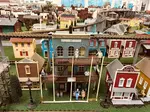 |
DCC Decoder Installation

Installing Decoders - Not the Most Glamorous Detail for the Model Train Enthusiast
written by Daryl Clayton Kennedy
If you aren't comfortable around soldering tools and wires, you are in for one heck of a ride. Most decoders will require a tad bit of soldering. The good news is these decoders are mostly used in old school locomotives as newer models come equipped with the latest technology.
When dealing with older models you'll need to first recognize which wire connects to which connection in the locomotive.
Here is a Quick Crash Course that Applies To Most if Not All Decoders
Wire Color -- Connection
Orange ---------- Motor's positive connection
Gray ------------ Motor's negative connection
Yellow ---------- Rear Lights
Black ----------- Electrical pickup (Left side of track)
Red ------------- Electrical Pickup (Right side of track)
Blue ------------ Connects to ALL lights (Front and Rear)
Green ---------- F1 (Function one)
White ---------- F0 (Function zero)
Luckily the color schemes reported in the chart above are an NMRA standard. Yes... that means every decoder, wherever you purchase it, is the same as far as connection setup.
What Do You Do If Your Locomotive was bought in the 90's or Better Yet, How About the 80's?
Unfortunately, these not-so-old locos like older thomas the train engine locomotives will need what's commonly referred to as drop in decoders. These little green devils will need a little TLC as you must slide them in the exact location as the locomotives previous board. That's O.K. because the designers were on the ball when they put these puppies together and configured them to fit perfectly in piston with just a smidgen of soldering.
If you're lucky, you'll find yourself hovering over one of the easiest forms of decoders as far as installation.
Short of not having to do anything at all, plug in and play decoders are so simple that a well trained, steady hand monkey could do it.
All that's required of you with these friendly rascals is to remove your model trains cover and plug in the decoder utilizing a sort of plug or adapter that conveniently fits a socket in the original board. When we say board some of you may know this as a light board.
If you guys and gals don't wish to go through the hassles of tediously fumbling through the aforementioned process, of course your best bet is to buy a model train set or locomotive with the decoder already installed. Some of you may be thinking... where is the fun in that. Trust me, not everyone is cut out for electrical work.
Cruise through building-your-model-railroad for additional tips, tricks and secrets to make your layouts more realistic and your locomotives more prototypical.
About the Author: Daryl Clayton Kennedy is the Editor of www.classymodeltrains.com a modeler's community that's perfect for those train lovers looking to gather information and reviews surrounding the model train industry.
From "DCC Decoder Installation" to "HomePage"
Tracks Newsletter: Sign Up Here!
√ = ad or sponsored link
What's New on BYMRR.com?
Recent Articles
-
Model Railroad Supplies
Dec 16, 25 03:46 PM
We have started a new store to help you build your layout and teach your youngsters about science with STEM products. -
DC and/or DCC on the Same Layout
Mar 09, 25 10:46 AM
How to wire your layout for either DC and/or DCC operation. -
Looking for a locomotive speaker
Nov 24, 24 07:29 AM
First Name: Randy E-Mail Address: bymrr@building-your-model-railroad.com Enter your question: : I am looking for a speaker for a Walthers EMD SD70ACE Locomotive, product number 910-9866. The control b…
Digitrax decoder with sound









